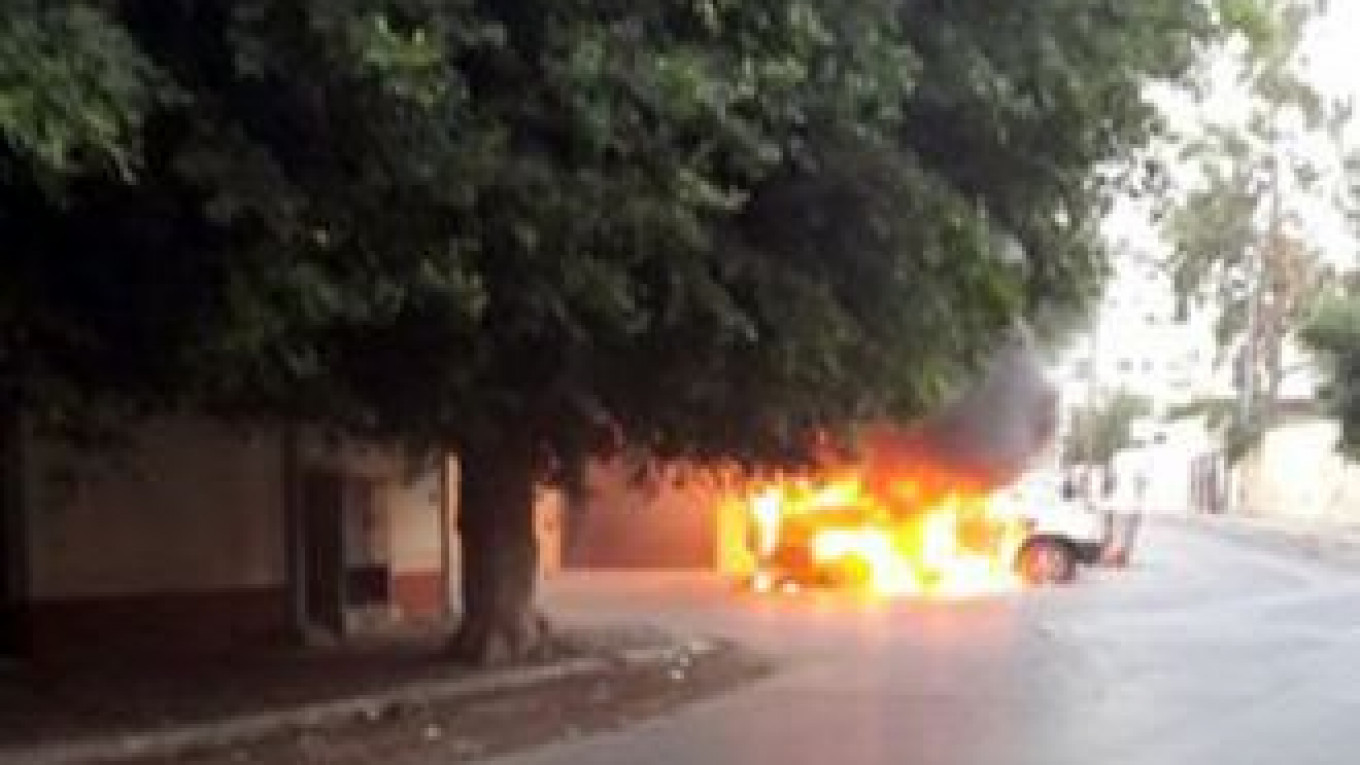Russia evacuated its diplomats from Libya on Thursday after an armed group stormed the Russian Embassy in Tripoli and clashed with government security forces in a bloody shootout.
The attack came after several dozen people rallied in front of the Russian Embassy in Tripoli late Wednesday night, with attackers firing at an embassy car, climbing on to the roof of the building and tearing down the Russian flag.
The perpetrators are believed to be relatives and friends of a Libyan officer who was murdered by a Russian woman a day before the attack, Foreign Ministry spokesman Alexander Lukashevich said in a statement.
The building was slightly damaged, but no Russians were injured, as embassy employees managed to find shelter in secure rooms in the building. Two attackers were killed and four of them were injured in a shootout with Libyan security forces, while several others fled the scene, media reports said.
"In the current situation, we decided to immediately evacuate all employees of Russian diplomatic compounds from Libya via Tunisia," Lukashevich said, adding that all the embassy staff and their families had crossed the Tunisian border Thursday and would be transported to Moscow by an Emergency Situations Ministry's charter flight Friday.
A group of top Russian diplomats will stay in Tunisia to engage with Libyan officials, however. ?
Yekaterina Ustyuzhaninova, the woman reported to have killed the Libyan officer and also stabbed his mother, was arrested and a criminal case has been opened against her, Lukashevich said.
Although Ustyuzhaninova's motive is still unclear, some media reports tied it to her support of former Libyan ruler Muammar Gadhafi. Ustyuzhaninova, who moved to Libya in 2011 and was a supporter of Gadhafi, killed the Libyan officer because he had fought against government forces during the civil war that led to Gadhafi's overthrow two years ago, the reports said.
Ustyuzhaninova's political stance is not unprecedented. In June, the Libyan Military Court convicted several Russians of collusion with the Gadhafi regime, and one of them was sentenced to life in prison.
Analysts interviewed by The Moscow Times said the incident was not very surprising, however.
"The situation in Libya is still very tense and people overreact about anything related to Gadhafi; it was an excessive act, and those who committed it probably wanted a repeat of what happened at the U.S. Embassy a year ago," said Alexei Malashenko, an analyst with the Carnegie Moscow Center.
Gunmen attack Russian embassy in Tripoli.
Attacks on foreign embassies are not uncommon in Libya and sometimes result in deaths of Western diplomats. In perhaps the most widely publicized example, a group of militants attacked the U.S. consulate in Benghazi last year, killing the ambassador and three other Americans.
Libyan Prime Minister Ali Zeidan and the country's foreign minister, Mohammed Abdulaziz, visited the Russian Embassy on Wednesday night and told the ambassador that Libyan authorities could not guarantee safety to diplomats.
In a telephone conversation with Foreign Minister Sergei Lavrov, however, Abdulaziz said the authorities would do "everything possible" to stabilize the situation so that diplomats could come back to Tripoli.
Just last month, Lavrov and Abdulaziz held talks in Moscow, after which Lavrov said that the ministers had agreed to significantly increase business, military and technical cooperation between the two countries and that Russia and Libya shared common approaches to resolving conflicts in the Middle East. ?
But analysts say that even despite the seemingly fruitful bilateral talks, relations between Moscow and Tripoli are still in bad shape after Gadhafi's removal.
"There are no relations anymore; they only existed when Russia was selling arms to Gadhafi and promising to build him a railroad in Libya. Now, the attitude among Libyans toward Russia is mostly bad because Russia supported Gadhafi in some way — at least, it allowed him to turn from a regular colonel into a great tyrant," said Georgy Mirsky, an expert in Middle East studies at the Institute of World Economy and International Relations.
Malashenko said it was not clear with whom Russia would sign business contracts now as Libya could soon be divided into three parts, and two years after the civil war, there was no stability to guarantee successful development of bilateral relations.
The U.S. Embassy in Moscow on Thursday condemned the attack on the Russian Embassy in Tripoli.
"We condemn all violence against facilities protected by international law," it said on Twitter.
Russia's Foreign Ministry recommended that Russians avoid traveling to Libya, but apart from that, it is not clear whether there will be more fallout from the attack.
"The Russian reaction from here on out depends on how the incident will be qualified — as a deliberate provocation or an attack motivated by personal animosity — but Russia's policy in Middle Eastern countries is not always appropriate and predictable," Malashenko said.
Contact the author at [email protected]
A Message from The Moscow Times:
Dear readers,
We are facing unprecedented challenges. Russia's Prosecutor General's Office has designated The Moscow Times as an "undesirable" organization, criminalizing our work and putting our staff at risk of prosecution. This follows our earlier unjust labeling as a "foreign agent."
These actions are direct attempts to silence independent journalism in Russia. The authorities claim our work "discredits the decisions of the Russian leadership." We see things differently: we strive to provide accurate, unbiased reporting on Russia.
We, the journalists of The Moscow Times, refuse to be silenced. But to continue our work, we need your help.
Your support, no matter how small, makes a world of difference. If you can, please support us monthly starting from just $2. It's quick to set up, and every contribution makes a significant impact.
By supporting The Moscow Times, you're defending open, independent journalism in the face of repression. Thank you for standing with us.
Remind me later.


